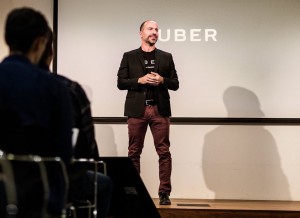
Uber CEO Dara Khosrowshahi is shutting down the company's autonomous vehicle testing operations in Arizona.
Uber is shutting down its Arizona-based self-driving car operations in the wake of the collision that killed a pedestrian in March. The company told its nearly 200 workers of the decision earlier today.
The company halted its testing after the collision that killed a woman walking across a four-lane road with a bike. The car’s autonomous system failed to recognize the person and take evasive action and the observer in the vehicle was looking down at the time of the crash.
Since that time, the company put the program on hiatus while paying the remaining drivers as the National Transportation Safety Board conducted an investigation. Investigators haven’t wrapped up their inquiry.
Uber plans to restart testing self-driving cars in Pittsburgh and San Francisco once federal investigators conclude their inquiry into the Tempe crash.
(Safety advocates calling for a ban on the name “Autopilot.” Click Here for the story.)

The video footage of Uber's collision with a pedestrian shows the car made no attempt to swerve or slow down.
“We’re committed to self-driving technology, and we look forward to returning to public roads in the near future,” Uber said in a prepared statement.
“In the meantime, we remain focused on our top-to-bottom safety review, having brought on former NTSB Chair Christopher Hart to advise us on our overall safety culture.”
Uber will continue offering its traditional rider service in Arizona. The move is just the latest in an effort by the company to rehabilitate its reputation, including amending how it handles sexual assault accusations.
(Click Here for more details about the self-driving Uber test vehicle killing a pedestrian.)
Uber will stop using the forced arbitration contained in its terms of service. The move comes after reports surfaced revealing at least 100 Uber drivers in the U.S. had been accused of sexually assaulting passengers in recent years, including one recent case in which a driver followed a female passenger after reaching her home and tried to force himself into her apartment.

An Uber Volvo XC90 was involved in a minor crash during a test program near Phoenix. Under the Self Drive Act, they're still required to report it.
Critics have also accused the service of lax background checks that have allowed some convicted of sex crimes to go to work for the company.
The company’s move on arbitration came as Khosrowshahi came under increasing pressure from the likes of Connecticut’s Democratic Senator Richard Blumenthal, who wrote the CEO a letter in he “respectfully requested” Uber end the practice.
(Uber acquires bike-sharing company, Jump. Click Here for the story.)
Uber is also facing pressure to end the use of arbitration in other instances, including cases where employees claim they have been forced out of the company due to workplace sexual harassment.
